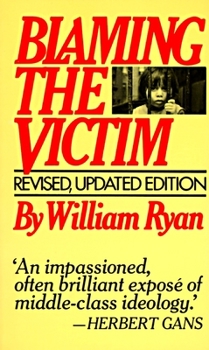Blaming the Victim
Select Format
Select Condition 
Book Overview
The classic work that refutes the lies we tell ourselves about race, poverty and the poor. Here are three myths about poverty in America: - Minority children perform poorly in school because they are "culturally deprived." - African-Americans are handicapped by a family structure that is typically unstable and matriarchal. - Poor people suffer from bad health because of ignorance and lack of interest in proper health care. Blaming the Victim was the...
Format:Mass Market Paperback
Language:English
ISBN:0394722264
ISBN13:9780394722269
Release Date:January 1976
Publisher:Vintage
Length:368 Pages
Weight:0.43 lbs.
Dimensions:0.9" x 4.2" x 6.9"
Customer Reviews
2 ratings
Fix the social arrangments that make weaknesses crippling
Published by Thriftbooks.com User , 21 years ago
Everyone has weaknesses. In the best of circumstances these flaws are inconsequential and invisible. But when we are in distress, they get in the way or cause outright harm.Institutions and customary social arrangements can ease the causes of distress. If we create institutions that alleviate people's predicaments, their flaws and weaknesses do not surface. As a demonstration on a relatively small scale, consider Milton Mazer, People and Predicaments.The issue here is not welfare, in the sense of labor-free livelihood. Everyone knows only the most wealthy deserve that. Think public transportation that works. Think medical care. Think intervention into abuse. Think Head Start, an enormous success for very little money. Think paying teachers commensurately to their training and their contribution to society. Our institutions and customary social arrangements benefit some people more than others. It's an obvious but oddly ignored truth that those benefited most are least aware of it. That's just the way life is for them, so it must be so for everyone. Consequently, it seems to them that another's unsuccess must be due to a failure of intention or even to willful parasitism. This is what Ryan identifies as blaming the victim.Does "destructive behavior underpin poverty" or does institutionalized poverty expose and amplify human frailty with destructive consequences? The question is, if you want to change matters, what is effective. Shaking one's finger and instructing people in proper values has never had much effect. To say that failure is due to ineradicable character flaws obviously goes nowhere, unless to euthanasia.The proposition that the poor are "held back by lack of work ethic and strong family values" is profoundly insulting to the vast majority of working poor who work very hard indeed. (Consider Ehrenreich's experience, reported in Nickel and Dimed.)The defense of Banfield by the second reviewer, couched as an attack on "Ryan and his ilk", is of only historical relevance to Ryan's book today. I do agree that framing the issues in racial terms is a weakness of the book. The problem reaches farther and deeper than either its ethnic or ethical physiognomy suggests. Consider Z. Harris, The Transformation of Capitalist Society.
A Timeless Classic
Published by Thriftbooks.com User , 23 years ago
The first chapter in this book, alone, makes this a classic for understanding how social problems are dealt with in our individualistic ideological society. His formula for "Blaming the Victim" covers just a couple of pages but is than intellectually expounded upon in this book by analyzing various social problems. Some may consider William Ryan an ideologue; however, I find him to be a practical fellow. He doesn't view the formula for "Blaming the Victim" as inherently evil as some radicals might - he simply finds it as the root cause for not solving social problems in our society. If the root cause of a social problem is the social structure, yet we seek to solve the social problem through, strictly, rehabilitation of the individual, the social problem is left unsolved. I have taught several classes on poverty, social problems and social welfare and am able to utilize Ryan's book in all of these classes. His presentation is put forward in a common-sense manner, and he provides a rational refutation on commonly held beliefs on problems ranging from poverty to child abuse. This is a book worth getting if for no other reason to reevaluate how we look at problems and more importantly how to go about solving them.





